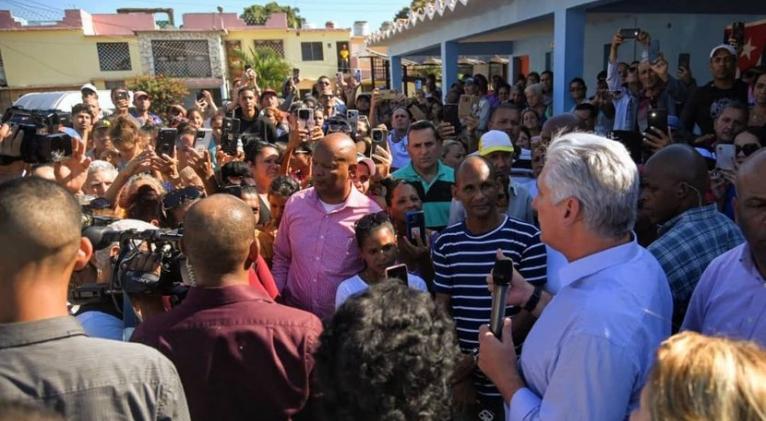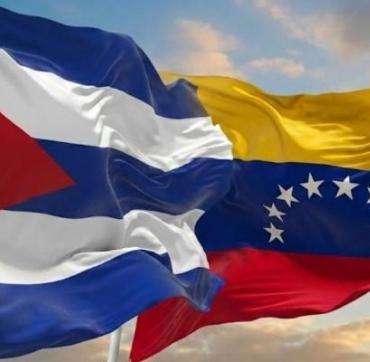A Historic Responsibility that Exalts: Giving Everything for the Revolution
especiales

On the afternoon of this hot Wednesday in February, the First Secretary of the Central Committee of the Communist Party and President of the Republic, Miguel Díaz-Canel Bermúdez arrived in Trinidad, a municipality in Sancti Spiritus located in the center of Cuba, after traveling the more than 70 kilometers that separate it from the Cienfuegos territory of Cumanayagua.
Together with the member of the Political Bureau and Secretary of Organization of the Central Committee, Roberto Morales Ojeda, and the highest authorities of the Party and the Government of the province and the municipality, the president began his agenda with a visit to the “Félix Salabarría” Subdivision, located in “La Purísima” urban Popular Council.
This is one of the neighborhoods in transformation where more than 1,300 people live. The Head of State spoke to a representation of the residents, who enthusiastically welcomed him, in front of the neighborhood's grocery store, after learning about a characterization of the main problems that impact the services and those where work is done. Among the main works appear the improvement of water supply, a claim of the locals who today are grateful for the stability of the vital service.
Díaz-Canel stopped by at the community's elementary school, where he held a lively talk with children, teachers and other workers of the center about the progress of the educational teaching process.
Later, also in Trinidad, the Cuban president visited Los Molinos Base Business Unit, belonging to the Sancti Spíritus Porcine Company. The productions of this entity, dedicated to the breeding of pigs, are designed to its state mission, which is to encourage the producers with whom they have agreements, to breed pigs for fattening and marketing.
Together with the directors of the facility, the Head of State toured the production area, where he received an explanation about the recovery projections of an entity that, although it had deficiencies some time ago, is already showing signs of progress and, in January of this year, managed to increase the average salary of its workers. In the current conditions of Cuba, the revitalization of pork production is a priority issue for the national economy.
As the afternoon advanced, and more than 50 kilometers that separate the city of Sancti Spíritus from Fomento, the President of the Republic arrived at this other municipality in Sancti Spíritus.
In the Comprehensive Production facility "La Anguila", the president toured its areas, guided by producer Yarién Negrín Cáceres, a young usufructuary who in 2013 graduated as a biomedical engineer, at the Central Universidad Marta Abreu.
By applying science and all the passion for the soil, diversifying its productions, this farm contributes to the self-sufficiency of Fomento. They say that it emerged in an inhospitable terrain, in front of the eyes of many skeptics. However, today, in its almost 66 hectares, notable results are achieved from the development of several production lines.
It's admirable to see how much has been achieved, amidst difficult conditions, in large and small livestock farming, pig farming, various crops - including low-input potatoes - aquaculture, tobacco, coffee, soybeans and a mini-factory.
The productions of "La Anguila" are intended for social consumption and for sale to the population of the municipality. In all of them there’s the proper use of science and innovation.
The Cuban President greeted the workers, and asked about the working conditions and toured areas of the farm. In his pleasant conversation with Negrín he inquired about how much his university studies contributed to the transformation and organization of the farm. "With 100 producers like him, a lot of progress is made in the country," acknowledged the president.
The Head of State, also passionate about this decisive issue for the development of Cuba, praised the results of this project, which he described as "well-conceived and organized, done with thought."
As it got dark, at the end of the fruitful day, Díaz-Canel visited the Norte People's Council, where hundreds of people were waiting to greet him. There, in a meeting with the residents of District No. 1, he learned about the social works that have been carried out related to services, the incorporation of young people into employment and attention to vulnerable families.
The residents assure that this neighborhood in transformation constitutes one of the most important in the economic and social life of Fomento, hosting important health, education and gastronomy centers in the municipality.
The Head of State spoke to the inhabitants of the community and explained the objectives of this visit, as he does in each territory he visits throughout the country.
He stressed that here, in Fomento, today the cycle of tours of all the municipalities of this central province is completed, started last year, as part of a work agenda that will continue to be implemented throughout the country during 2025.
Doing for the people, within their ranks, and together with them
The closing briefing of these visits leave good results, because they are the opportunity to reflect on the reality of Cuba and of each municipality in particular. This Wednesday evening, in the municipality of Fomento in Sancti Spiritus, several voices were heard that, added together, made a very necessary reflection.
The strategic issue of how to treat the youngest, for example, motivated President Díaz-Canel to emphasize the importance of talking, of dialoguing, of transforming, because these are political tasks concerning the Communist Party, the Youth, and all the organizations that must work in the face of the demographic challenge Cuba is experiencing.
“The first thing is to talk, the first thing is to diagnose,” said the president to the leaders present at the meeting. And in reference to the work of the militancy, the member of the Political Bureau Roberto Morales Ojeda reflected on the importance of “taking care of the internal life of the Party, and of being in the Party scenarios.”
Ojeda shared a basic question: Can one defend something in which one does not believe? He said this in the sense that, for all political work, convictions and even feelings are vital, and understanding that the life of a vanguard political organization cannot be something formal.
Towards the end of the day, President Díaz-Canel expressed concepts that greatly concern today's Cuba. The Head of State emphasized that there’s a prioritized task: to defend and preserve the Revolution. “I would say that this is the great historical mission of the generations we are forming today,” said the president, who referred to this mission as something to be deployed in all spaces and levels of Cuban society.
The Head of State affirmed that the best way, in these times, is for all of us together to begin to change the situation of the country, hit by the siege of the blockade, by the terrible days of COVID-19, and now by a US administration, “from which we should not expect anything other than reinforcement of the measures” of that blockade.
Regarding defending the Revolution, the dignitary spoke of this election as “a historical responsibility that exalts; to say: I am going to give everything for the Revolution, and do it with the people to which we belong.”
Díaz-Canel Bermúdez reflected on the importance of the connection with the base. In this regard, he emphasized that this “is not just any issue, it’s not an issue to be mistreated.”
To the leaders, the president explained that the connection with the base is a need for the work of the Party, and it’s also a way of responding to the need that the people have to find the answers, the ways to be able to raise their concerns.
The connection with the base is first of all, he said, an expression of respect for the people, and of sensitivity towards that trusting people, because it knows that there’s concern for their problems.
One of the results of these visits, said the dignitary, is that we see the bad but also the good experiences: “Life is telling us, from good experiences, that the current situation can be reversed.”
Translated by Amilkal Labañino / CubaSí Translation Staff














Add new comment